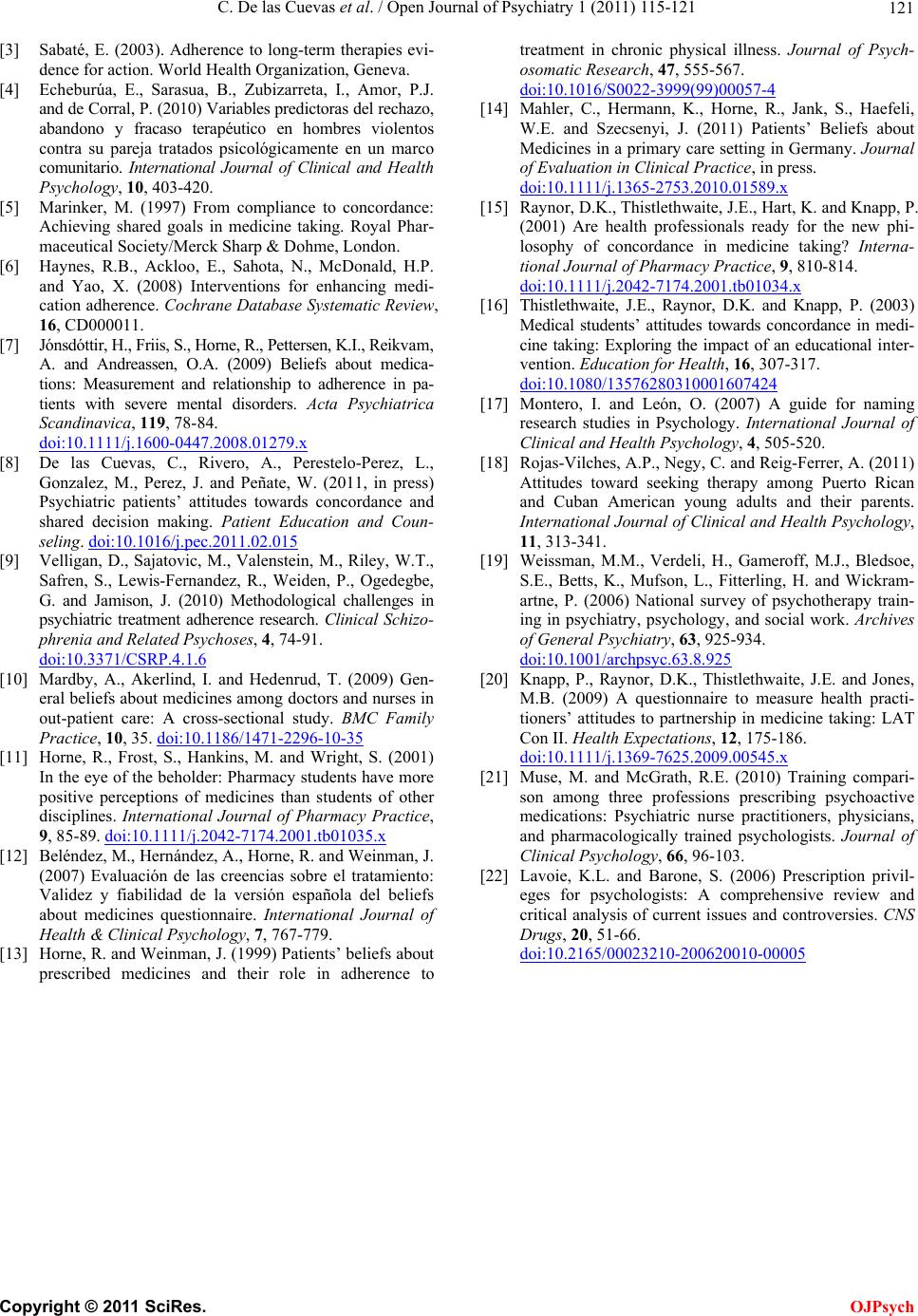
C. De las Cuevas et al. / Open Journal of Psychiatry 1 (2011) 115-121 121
[3] Sabaté, E. (2003). Adherence to long-term therapies evi-
dence for action. World Health Organization, Geneva.
[4] Echeburúa, E., Sarasua, B., Zubizarreta, I., Amor, P.J.
and de Corral, P. (2010) Variables predictoras del rechazo,
abandono y fracaso terapéutico en hombres violentos
contra su pareja tratados psicológicamente en un marco
comunitario. International Journal of Clinical and Health
Psychology, 10, 403-420.
[5] Marinker, M. (1997) From compliance to concordance:
Achieving shared goals in medicine taking. Royal Phar-
maceutical Society/Merck Sharp & Dohme, London.
[6] Haynes, R.B., Ackloo, E., Sahota, N., McDonald, H.P.
and Yao, X. (2008) Interventions for enhancing medi-
cation adherence. Cochrane Database Systematic Review,
16, CD000011.
[7] Jónsdóttir, H., Friis, S., Horne, R., Pettersen, K.I., Reikvam,
A. and Andreassen, O.A. (2009) Beliefs about medica-
tions: Measurement and relationship to adherence in pa-
tients with severe mental disorders. Acta Psychiatrica
Scandinavica, 119, 78-84.
doi:10.1111/j.1600-0447.2008.01279.x
[8] De las Cuevas, C., Rivero, A., Perestelo-Perez, L.,
Gonzalez, M., Perez, J. and Peñate, W. (2011, in press)
Psychiatric patients’ attitudes towards concordance and
shared decision making. Patient Education and Coun-
seling. doi:10.1016/j.pec.2011.02.015
[9] Velligan, D., Sajatovic, M., Valenstein, M., Riley, W.T.,
Safren, S., Lewis-Fernandez, R., Weiden, P., Ogedegbe,
G. and Jamison, J. (2010) Methodological challenges in
psychiatric treatment adherence research. Clinical Schizo-
phrenia and Related Psychoses, 4, 74-91.
doi:10.3371/CSRP.4.1.6
[10] Mardby, A., Akerlind, I. and Hedenrud, T. (2009) Gen-
eral beliefs about medicines among doctors and nurses in
out-patient care: A cross-sectional study. BMC Family
Practice, 10, 35. doi:10.1186/1471-2296-10-35
[11] Horne, R., Frost, S., Hankins, M. and Wright, S. (2001)
In the eye of the beholder: Pharmacy students have more
positive perceptions of medicines than students of other
disciplines. International Journal of Pharmacy Practice,
9, 85-89. doi:10.1111/j.2042-7174.2001.tb01035.x
[12] Beléndez, M., Hernández, A., Horne, R. and Weinman, J.
(2007) Evaluación de las creencias sobre el tratamiento:
Validez y fiabilidad de la versión española del beliefs
about medicines questionnaire. International Journal of
Health & Clinical Psychology, 7, 767-779.
[13] Horne, R. and Weinman, J. (1999) Patients’ beliefs about
prescribed medicines and their role in adherence to
treatment in chronic physical illness. Journal of Psych-
osomatic Research, 47, 555-567.
doi:10.1016/S0022-3999(99)00057-4
[14] Mahler, C., Hermann, K., Horne, R., Jank, S., Haefeli,
W.E. and Szecsenyi, J. (2011) Patients’ Beliefs about
Medicines in a primary care setting in Germany. Journal
of Evaluation in Clinical Practice, in press.
doi:10.1111/j.1365-2753.2010.01589.x
[15] Raynor, D.K., Thistlethwaite, J.E., Hart, K. and Knapp, P.
(2001) Are health professionals ready for the new phi-
losophy of concordance in medicine taking? Interna-
tional Journal of Pharmacy Practice, 9, 810-814.
doi:10.1111/j.2042-7174.2001.tb01034.x
[16] Thistlethwaite, J.E., Raynor, D.K. and Knapp, P. (2003)
Medical students’ attitudes towards concordance in medi-
cine taking: Exploring the impact of an educational inter-
vention. Education for Health, 16, 307-317.
doi:10.1080/13576280310001607424
[17] Montero, I. and León, O. (2007) A guide for naming
research studies in Psychology. International Journal of
Clinical and Health Psychology, 4, 505-520.
[18] Rojas-Vilches, A.P., Negy, C. and Reig-Ferrer, A. (2011)
Attitudes toward seeking therapy among Puerto Rican
and Cuban American young adults and their parents.
International Journal of Clinical and Health Psychology,
11, 313-341.
[19] Weissman, M.M., Verdeli, H., Gameroff, M.J., Bledsoe,
S.E., Betts, K., Mufson, L., Fitterling, H. and Wickram-
artne, P. (2006) National survey of psychotherapy train-
ing in psychiatry, psychology, and social work. Archives
of General Psychiatry, 63, 925-934.
doi:10.1001/archpsyc.63.8.925
[20] Knapp, P., Raynor, D.K., Thistlethwaite, J.E. and Jones,
M.B. (2009) A questionnaire to measure health practi-
tioners’ attitudes to partnership in medicine taking: LAT
Con II. Health Expectations, 12, 175-186.
doi:10.1111/j.1369-7625.2009.00545.x
[21] Muse, M. and McGrath, R.E. (2010) Training compari-
son among three professions prescribing psychoactive
medications: Psychiatric nurse practitioners, physicians,
and pharmacologically trained psychologists. Journal of
Clinical Psychology, 66, 96-103.
[22] Lavoie, K.L. and Barone, S. (2006) Prescription privil-
eges for psychologists: A comprehensive review and
critical analysis of current issues and controversies. CNS
Drugs, 20, 51-66.
doi:10.2165/00023210-200620010-00005
C
opyright © 2011 SciRes. OJPsych